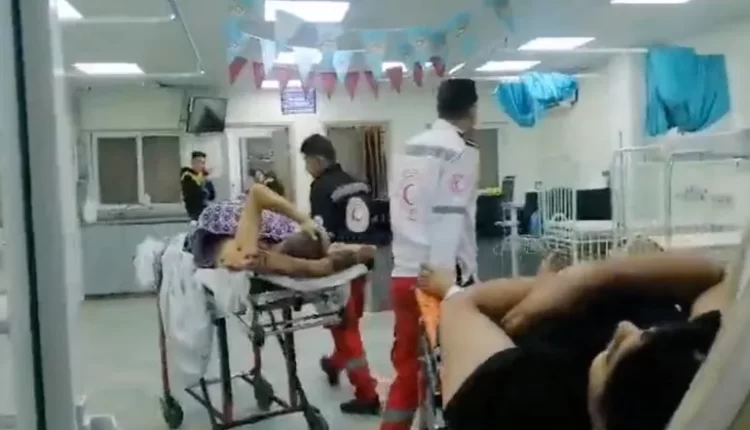‘Save what remains of Gaza’, hospital director says, amid bombing
The 35-year-old’s wife and daughter were killed along with 10 other family members and neighbours in an Israeli attack on their home. He lies on a bed in the European Gaza Hospital in the southern city of Khan Younis, surrounded by sounds of other patients moaning and crying out in pain.
Isleem was pulled out from under the rubble of his home last month.
“I cannot believe that I am still alive,” he says. “Getting out from under the rubble was very difficult. I wished I had been martyred with my family instead of the suffering and pain I am experiencing now.”
Isleem suffered multiple shrapnel injuries on different parts of his body including his abdomen, and underwent surgery on his digestive system and another operation to insert platinum in his foot after it was broken.
“There is no safety, no treatment, nothing,” he says. “I cannot bear my pain and the screams of the other injured people around me as well.”
Due to the lack of fuel and medical supplies and the Israeli targeting of hospitals, the healthcare system in the Gaza Strip has all but collapsed. And as hospitals in northern Gaza and Gaza City have been rendered out of service, the burden on the few functional hospitals in the central and southern parts of the enclave has increased.
The European Gaza Hospital receives dozens of Palestinians killed and wounded on a daily basis, some of them referrals from other overwhelmed hospitals. It is also a place of shelter for displaced people, despite the lack of provisions.
Khawla Abu Daqqa, 40, is from the eastern Khan Younis area, near the Israeli fence which has been targeted frequently by bombings and artillery shelling. She fled with her five children to the hospital, saying she had no choice.
“Where do we go? We have no shelter,” she says. “Everything is difficult here, from finding food, water and even sleep. I wish I could sleep at least five hours a day. I cannot sleep or rest. I hope this war will stop for everyone.”
‘Extreme fatigue’
In a conversation with Al Jazeera, the director of the European Gaza Hospital, Dr Youssef al-Aqqad, says that displaced people – who come from all over the Gaza Strip – are having to find space wherever they can in the hospital: at the doors of patient rooms, in the corridors, on the stairs, and in the hospital garden.
“These displaced people need services, including food, water and electricity,” he says. “We also feel very concerned about the Israeli army targeting hospitals. This is an abnormal and terrifying thing for patients and displaced people as well.”
Al-Aqqad says dozens of wounded people arrive on a daily basis from the cities of Rafah and Khan Younis.
As a result, the number of infections is on the rise and has exceeded the capacity that the hospital can handle. Al-Aqqad says a field hospital has been set up in the Ras Naqoura School, which is adjacent to the hospital’s eastern wing and where patients with moderate or minor infections are treated.
“This is not an easy matter, but rather very complicated because the schools are not equipped and suitable to receive infected people and there is no medical equipment and devices there,” he says. “Furthermore, our medical staff is already stretched thin and have to follow up here and there, which had led to extreme fatigue.”
The hospital has 450 wounded patients. Some of them, he says, require multiple specialist doctors — such as a neurosurgeon, a vascular doctor, an orthopaedic doctor for broken bones, and another expert for burns.
The medical staff are exhausted from the non-stop work, and the volunteers who assist them have little to no experience.
“We need specialised doctors to work in intensive care rooms, operations and delicate surgical specialities,” al-Aqqad says. “We have reached a difficult stage in health services, and we feel that we are giving beyond our strength and ability to save the injured and try to treat them.”
‘Experiencing the worst of it all’
At least 26 out of the 35 hospitals in the Gaza Strip are not functioning due to the lack of fuel and attacks by the Israeli army.
In the northern Gaza Strip, the Indonesian Hospital has been bombed repeatedly by the Israeli army, which also ordered the evacuation of doctors and the wounded. This forced the Ministry of Health in Gaza to distribute the injured to hospitals in the central and southern Gaza Strip, including the European Gaza Hospital.
Al-Aqsa Martyrs Hospital is also under great pressure, after exceeding its capacity to receive people wounded in the Israeli attacks on towns and refugee camps in the central Gaza Strip, including Deir el-Balah, Nuseirat and Bureij.
Al-Aqqad urges international health and human rights organisations to intervene to stop “this hideous war” on Gaza.
“I have never seen in my life hospitals that are besieged and bombed out of service and forced to discharge patients to leave their hospital beds before completing their recovery process,” he says. “What we are experiencing is the worst of all. Save what remains of the people of Gaza.”

